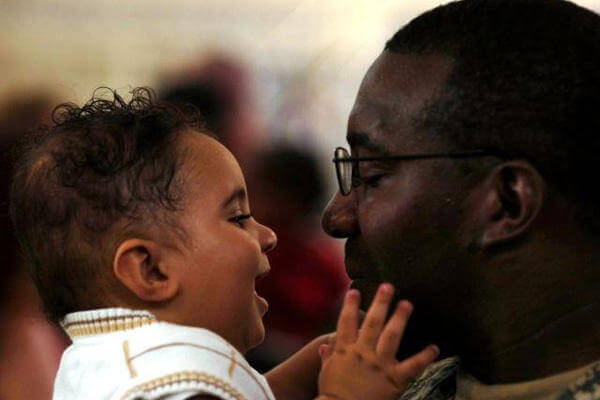Be as Candid as Possible
Consider sitting down as a family and discussing the deployment in ways that are age appropriate. Children need to understand the details about where the service member parent is going, how long she's going to be gone, and why everyone is behaving differently.
"For the kids, we talked a lot about where he was going, what he would be doing, and how important his job was. This let them feel like it was their 'duty' to 'allow' Dad to go away."
—Navy spouse
"We help our kids understand that Daddy is helping other children who can't defend themselves and that the soldiers/Marines/sailors/airmen are making the world a safer place."
—Navy spouse
Explain that the deployed parent will be serving our country, she'll be well trained and well protected, and she won't be gone forever. Talk about how the deployed parent will communicate while she's away (if you know) and how your child can communicate with her. Let your child know that he can exchange letters with the deployed parent and help prepare special care packages while she's deployed.
Ask your children if they have any questions and encourage them to share their thoughts about what's happening. Ask open-ended questions, such as, "How do you think your day will be different while Mommy is away?" Ask questions and encourage conversation that requires more than a one-word response, prompting kids to open up and share.
"To help them understand better where Daddy is going (and the time zone difference), we tell them that Daddy is going far away and that when he goes to bed he will send them the sun to let them know it's time to wake up and they need to send him the moon so that he knows it's time to sleep."
—Navy spouse
Open Lines of Communication
Your child needs to feel that he or she has a network of support through this deployment. Inform your child's caretakers (such as babysitters, teachers, coaches, spiritual leaders, etc.) about the deployment so that they understand the challenges your child may experience. Make sure your child is aware of the ways in which she can communicate with the deployed parent while he's gone. Also, make sure your child knows she can communicate with you or other trusted adults about her feelings related to the deployment.
"Surround the child with as much positive atmosphere and supportive peers as possible. Kids hear and see a lot. Let people in their lives know what is going on, such as teachers and coaches. They can act as mentors and help mirror what you say at home."
—Army spouse
School Involvement
While the family is experiencing the anxiety of pre-deployment preparedness, the school environment will remain routine. This can present your child with a healthy dose of normalcy in the regular scheduling but will often present unique challenges. Meet personally with your child's teacher, school counselor, and principal to discuss the upcoming deployment. Give them as much information as you are comfortable with and encourage them to stay in communication with you. If you do not live in a town where deployments are common, you can print the Department of Education's "The Educator's Guide to the Military Child During Deployment" here: www2.ed.gov. This guide will explain the basics of the deployment cycle and teach educators behaviors to expect—and encourage empathy for these behaviors—and behaviors that are cause for alarm.
"I sign the kids up with the counselor at school for any type of deployment services that are available. I make sure their teachers know ahead of time (when we are allowed to let people know ahead of time)."
—Air Force spouse
Expectations
Talk to your children about your expectations of them while the service member parent is gone. Let them know that there may be new expectations of them—for example, more chores—but they will never be expected to take on a role that's not age appropriate.
Let your child express what he or she expects from the service member parent as well as the stay-at-home parent or caretaker. Encourage your service member to write a letter for the child to read after his departure, perhaps including references to some of the expectations that were discussed with the child.
"My husband and I together tell the kids if Dad is leaving. We talk about what he is going to do, his job of helping people, and that he will hurry back as soon as his job is done. We reassure them that I will be here every step of the way, and that it is okay to be sad."
—Marine spouse
Try to avoid suggesting that the son or daughter is now the "man or woman of the house." This puts tremendous pressure on a child to live up to a standard that he can never meet. It is not only unrealistic but also unfair. Children, even teenagers, should be allowed to be just that: children.
Upon deployment, it is normal for roles and responsibilities of the entire family to change or shift. However, these new roles need to be negotiated clearly and should always be age appropriate.
|
Talk, Listen, Connect The Sesame Workshop created the Talk, Listen, Connect initiative to help small children learn about and understand the changes brought on by a deploying parent. Talk, Listen, Connect is a multiphase, bilingual, multimedia initiative that guides families through multiple challenges, such as deployments, homecomings, and changes that occur when a parent comes home. The program has created invaluable tools to assist and support military families with preschool-age children, addressing their needs by using the power of the Sesame Street friends to bring to light their challenges as well as their great strength and resilience. You can learn more about this initiative and the tools it offers at www.sesamestreet.org. |
This excerpt is provided courtesy of the acclaimed free digital resource "Everyone Serves". Download your free copy with additional media content today at everyoneservesbook.com.


















